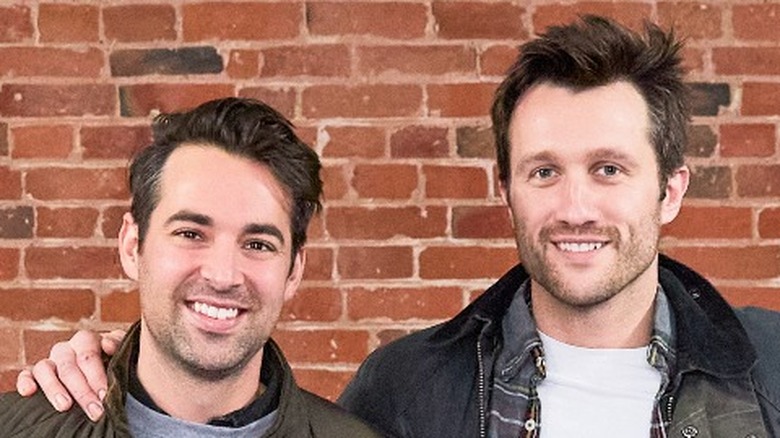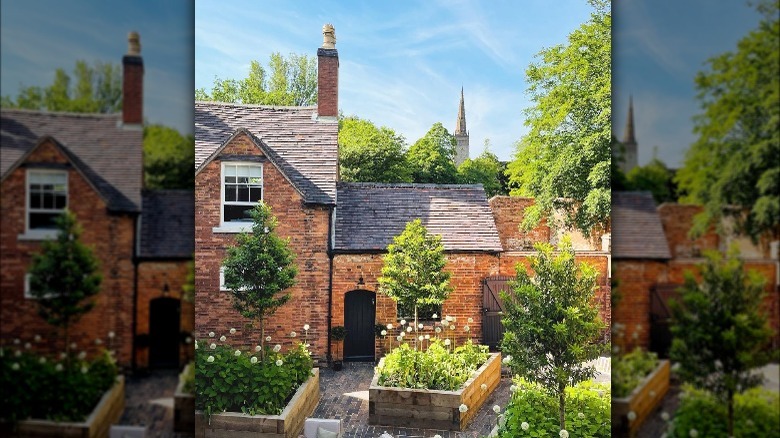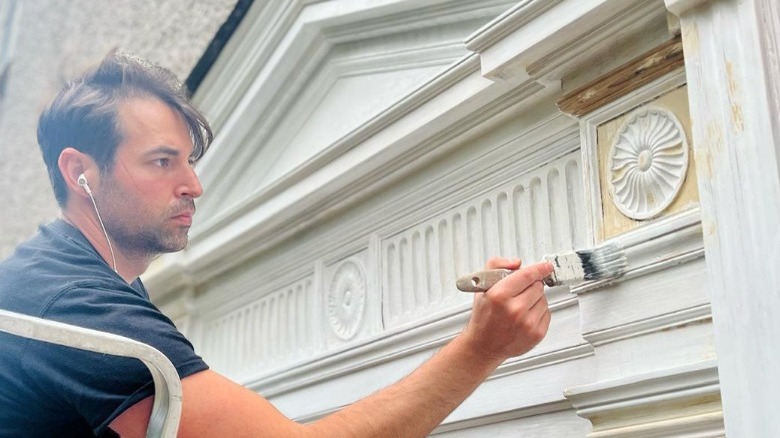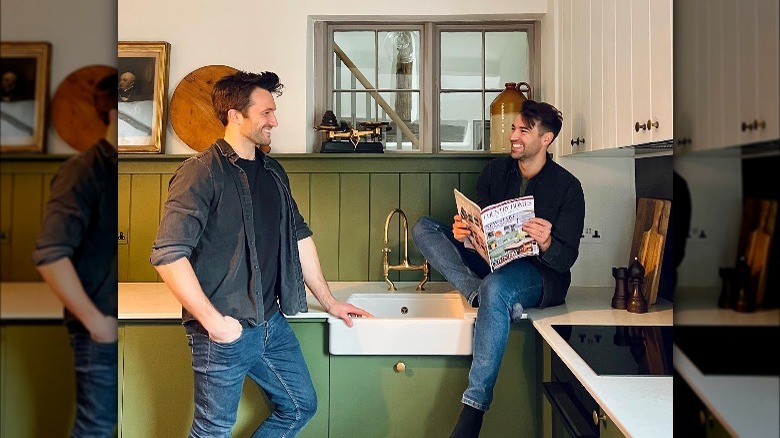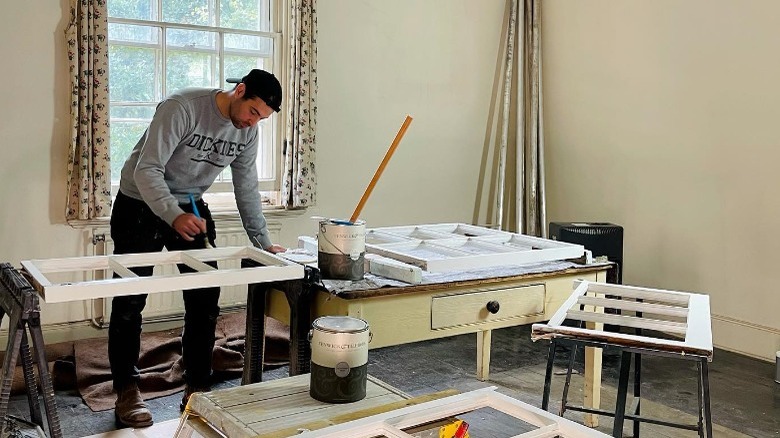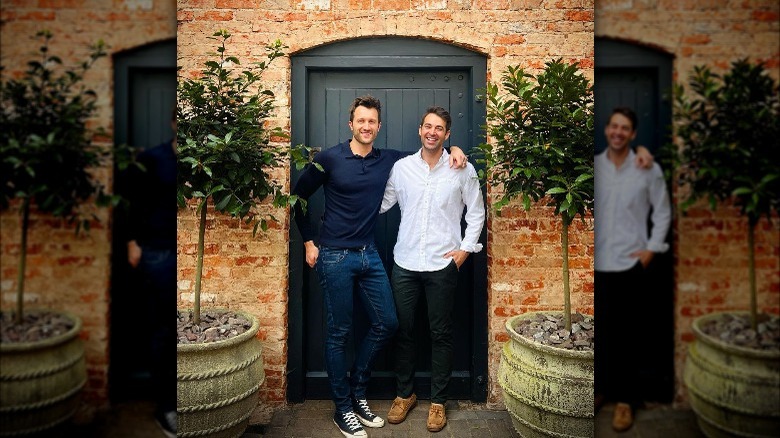HGTV's Dean Poulton And Borja De Maqua On Renovating A Bit Of History - Exclusive Interview
Owning a historic manor sounds like the start of a bestselling novel. But for Dean Poulton and Borja De Maqua, it's not as easy as the pages of a novel make it seem. The couple bought a Georgian estate in Warwickshire and has been restoring it to its former glory for the last three and a half years. Poulton, an architect, and De Maqua, a real estate agent, hadn't renovated much before taking on the project. They set out to restore all ten buildings on the magnificent estate.
Dean and Borja had been documenting the process on their Instagram, but have since paused to film HGTV's "Saving the Manor." It was love at first sight for the two when it came to this manor. And now they are lovingly restoring it on the show for future generations and current visitors. In an exclusive interview with House Digest, Dean Poulton and Borja De Maqua share what they love about this estate and everything they've learned on the journey.
The manor has an alluring history
Can you tell me a little bit of what drew you to the manor and what the story behind the land is?
Dean Poulton: We were actually only looking for a little cottage, and back then, it was really hard to find anything that caught our eye. Then this came up for sale ... We'd always passed it in the car, and we thought, "Well, we'll go have a look." We actually just had to go through one of the garden walls in the garden, and we were already in love with it. We hadn't even seen inside the house. We were ready to make an offer.
It's been in the same family for generations going all the way back to King Henry VII. King Henry VII actually gifted the land to the lord of the manor, and he's held [it] in his family ever since. It's passed down to all the family. We fell in love with the history of it as well [as] the fact that it's hundreds of years old, and it's had so many families living in it in the past.
Borja De Maqua: You could feel it, couldn't you?
Poulton: Yeah, it's got a good vibe.
De Maqua: It looks so bad that it was so charming. You know when it's just so bad that it's lovely? At least to us. Our family thought that we were bonkers!
Can you tell me a little bit about both of your backgrounds in restoration and renovation?
Poulton: We don't really have a background in restoration [or] renovation. I'm an architect, so I know how things go together and whatnot, and I do it through my work. But as an architect, you're not taught how to actually be on site and construct things yourself.
De Maqua: But you were quite good at DIY before I met you anyway.
Poulton: Yeah, my dad taught me a lot as I was growing up, and then as a result, I learned more and more things.
De Maqua: I was totally opposite. I was in real estate, and my life in Spain was socializing, going out, nothing to do with DIY. I've never even painted anything in my life until I met Dean, and I found a new path. And I was like, "Actually, I'm not that bad at this."
Poulton: I changed him into this crazy renovator that loves it now.
So was there a lot of onsite learning as you were restoring this manor?
Poulton: Oh, totally. A lot of YouTube, a lot of searching through books and finding out how best to do things. I look back [on when we started] and think, "Oh my gosh, I wish we could know what we know now," because we are constantly learning new skills that we never knew before.
De Maqua: And you always do things wrong. I always say to people when they want to attempt to do something, "As long as you lose the fear of going wrong, because it's quite likely your first time is going to go wrong, but you're going to learn, and then you're going to get better."
Poulton: Make a mistake on the cheap things. Maybe don't build a whole cabinet from scratch, the first thing you do, but paint a wall, because if you fail, you just have to paint it again.
Jumping in taught them a lot
Could you tell me what the most useful thing you learned doing this was?
Poulton: When we bought the estate, we got prices for everything that needed to be done, and plastering was one of the big-ticket items. So Borja [enrolled in] a four-day course before we bought the place to learn how to plaster, and that's his job from now on.
De Maqua: That saved a lot. That quote was over 100,000 pounds, and I paid 300 pounds [for] the course. Big saving there.
[In] the first episode, you are restoring those stables. How did you approach tackling that project?
Poulton: [The] hardest part for the first episode, the stables, was the restoration of all the windows and doors. You don't really see [it] in the show, but it's a hugely time-consuming project for us because we have to strip back hundreds of years of paint to expose the original wrought-iron windows again and the doors to get them repainted.
De Maqua: Probably we are too perfectionist, and we wanted things done how we like them, which means a lot of hours [on] every little project, which we still did. What it meant is we were working 20-hour days. But it was worth it. And one of the things that I enjoy [despite] these frustrations is that we want to keep the soul of that building.
Poulton: We're working with what we've got. In enhancing the character, it's not always about stripping out and starting from scratch. We've got a 300-, 400-year-old building; we should be celebrating its evolution to where it's right now.
De Maqua: Exactly.
Can you tell me what the hardest project that you tackled was at the manor?
Poulton: The hardest one so far has to be the outdoor toilets.
De Maqua: Yeah.
Poulton: It was because we're all about restoring and being able to work with what we've got, and that's what makes it less overwhelming because we're working with something that's already there. We're just enhancing it, making it better. But the outdoor toilets and the shower area—
De Maqua: We thought we only had to restore, and we ended up having to rebuild.
Poulton: A lot, yeah. Quite a lot.
De Maqua: It was very demotivating. I wanted to cry several times, but it was worth it.
Poulton: Yeah, we got there in the end.
There are plenty of projects left
Is there something that you're looking forward to renovating or restoring next?
Poulton: After this season, we're so excited to be doing the servants' kitchens because we've got an old range in there that dates back to around 1840, and we found a specialist company that would be able to restore it for us.
De Maqua: To have it completely functional again.
Poulton: Which is super exciting. That's what I'm looking forward to.
De Maqua: I really want to start on the manor house because ... it's got so much potential. We keep delaying it because we know that's the icing on the cake. We know we have to be the best we can be at working to make it incredible.
Poulton: That's what our plan has been all along. We've been working on the servants' areas, the stables, the caretaker's cottage. We've been working on that to enhance our skills so that by the time we get to the main manor house, we've honed all our skills and they're perfect, and we can get much better detail on the house we'll be living in.
De Maqua: No pressure.
Restoration was a learning process
Through all of this, what would you say has been your most essential tool for restoration for all your renovations?
De Maqua: I 100% will say a circular saw.
Poulton: Borja's more the carpenter in our duo, so I would say more like a power drill because it's so multifunctional, and we've pretty much use[d] it for anything. We've probably got about six of them now because it's always handy to have one set up, ready to go. So definitely a multi-power tool.
De Maqua: We love tools; we love tools so much.
Poulton: [In] Episode 1, the workshop is a space full of all [the] tools we've accumulated over the past few years of working on this place.
How did you balance restoration and modernization?
Poulton: We looked at the room, and what are these ... We wanted to keep most of the historic fabrics, so it was keeping that and adding modernization by color and types of furnishings, but not furnishings [that were] too modern. It had that hint of tradition in—
De Maqua: Yeah, we like reusing a lot. We [are] fairly good at mixing new with old. I'm very lucky that Dean's an architect because he is ... I know that I [can't] say the word "OCD," but [he] thinks too much about everything, where every wire will go through, because that's a difficult part when it's an old space — adding heating, adding lighting, adding all of that.
Poulton: With the materials that we picked as well, we tend to always go for natural materials like oaks and—
De Maqua: Stone.
Poulton: Yeah, and metals and stuff that is timeless so that it actually is appropriate in a traditional building, and it can be appropriate in a modern building as well. It works for both.
De Maqua: We do want to create something that in 100 years will be there, and [people] will be like, "Whoever did that renovation and saved this place did a good job, and it's still here." That's the aim.
The pair believes anyone can start restoring
Do you have any advice for people who are looking to restore their own historic homes?
Poulton: Don't get overwhelmed by all of it in one go. Focus on it a little bit at a time. For example, over the past month or two, we've been restoring just one singular door, and it's less overwhelming [because] you can really focus your attention on it so much more.
De Maqua: Basically, don't rush, and research. Research is so key. I'm very good at researching. I can get obsessed about researching every single thing about the tools and how to do these [things and spend] hours and hours so that you know what you're doing is how it should be done.
Poulton: If you're a newbie, start off [with] something easy, and then work your way up. That's exactly what we did. We worked on the areas that hadn't got a huge amount of detail because it's much easier for us to handle, and then we worked our way up to the heart of it.
De Maqua: Although it's stressful, it's definitely worth it, and it gives you life afterwards. When you finish, it's so rewarding.
Is there anything that you're excited for fans to see on the show?
Poulton: Everything. Being [on] social media over the past few years, we got so used to showing everyone what we've been up to, and we've hidden a whole section of our lives—
De Maqua: Months.
Poulton: And I'm so excited for them to see all the spaces that we've created because they're some of the best we've created so far.
De Maqua: The last space that we finish is always our favorite, and then we go again, and it's like, "Oh no, I love this one." We have pour[ed] our souls and life into this, so every space we are very excited [about] because we have spent a long time making them. But if we had to choose, I love the cellar. The cellar is super special.
Poulton: Yeah, very quirky and unique.
De Maqua: And then probably the outdoor shower because you get naked.
Poulton: I like the open plan. I like the open plan in the hayloft. We definitely saved the best for last on the last episode.
Watch the premiere of "Saving the Manor" on October 7 at 10 p.m. ET/9 p.m. CT on HGTV or on HGTV GO.
This interview has been edited for clarity.
